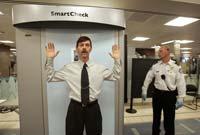Turban screening at airports is “offensive”

SIKHS IN CANADA HAVE JOINED SIKH ADVOCACY GROUPS IN THE US TO PROTEST THE SCREENING OF TURBANS AT AIRPORTS, ARGUING THE ADDITIONAL SEARCH OF THEIR RELIGIOUS HEADWEARS IS NOT REQUIRED AS THE TRAVELLERS PASS THROUGH THE FULL-BODY SCANNERS.
“This is getting ridiculous,” said Amrit Singh, a Vancouver businessman, who travels frequently to San Jose, where he has relatives.
I find this offensive as they seem to be targeting our religious values,” he said.
Sikh organisations have said federal transportation officials plan to always search turbans at airport screening stations, even if wearers pass through state-of-the-art body imaging scanners.
The groups are calling on their constituents to lobby the Congress and the Transportation Security Administration (TSA) to overturn what they said was an “unjust policy”, the New York Times reported.
Officials from the Sikh Coalition, United Sikhs and the Sikh American Legal Defense and Education Fund said they met with representatives of the Department of Homeland Security and the TSA several weeks ago.
“All of us jointly feel there are definitely some elements of racial profiling here,” said Jasjit Singh, associate director of the Legal Defense Fund, a civil rights group.
Hansdeep Singh, a senior staff lawyer for New York-based United Sikhs, said the meeting in Washington was arranged to hear about how new “advanced imaging technology” scanners would affect Sikhs. They had hoped the devices would eliminate the need for extra screening that they say they are subjected to at airports.
“We went in there with high hopes,” Singh was quoted as saying.
But the community representatives said they were told that the turbans will be treated “as a per se anomaly”, Singh said.
They said TSA officials declined to tell them whether the scanner is incapable of seeing through a turban, which typically has layers of fabric.
The advocacy groups met with officer for civil rights and civil liberties Margo Schlanger at the Department of Homeland Security, and special counselor to the TSA administrator Kimberly Walton, the New York Times said.
“While you’re spending that much time on Sikh Americans, who have absolutely no incidents of terrorism in the country, other people are getting through,” Jasjit Singh said. “In our faith, it’s the equivalent to being forced to be naked, effectively.”
When called for screening, Sikhs have the option of having their turbans patted down by a TSA officer or patting down their own turbans, after which their hands are inspected to trace chemicals. They are also screened with a hand-held metal detector.
Unlike metal detectors, body scanners can detect objects made with other materials, like plastic and ceramic. They are designed to identify explosives, like the type of bomb used by Umar Farouk Abdulmutallab, a Nigerian accused of trying to blow up a plane over Detroit last Christmas.
More than 300 body scanners have been installed at 65 airports in the US, according to the TSA Web site. An additional 450 scanners are set to be installed by next year.
TSA spokeswoman Sterling Payne said: “Removal of all headwear is recommended, but the rules accommodate those with religious, medical or other reasons for which the passenger wishes not to remove the item.”
“If the officer cannot reasonably determine that the clothing or head covering is free of a threat item, individuals will be referred for additional screening,” she said.
With the new body scanners, Payne said, officers still “screen bulky items to ensure they do not contain a threat, which includes the use of a hand-held metal detector”.
In Canada, dozens of body scanners have been installed in Canadian airports to comply with new U.S. security protocols.
The machines which can scan through clothing, be installed in Vancouver, Calgary, Edmonton, Winnipeg, Toronto, Ottawa, Montreal and Halifax.
The system, tested over the last year in British Columbia at the Kelowna Airport, allows a screening officer to see whether someone is carrying plastic explosives or other dangerous items.
Canadian officials said they had no comment on the US rules.
The U.S. controversy comes in the wake of US President Barack Obama’s cancellation of his visit to Sri Darbar Sahib (Golden Temple) in Amritsar India due to concerns over the Sikh tradition of covering the head.
World Sikh Organisation Senior Policy Advisor Gian Singh Sandhu said, “Gurdwaras around the world, including Sri Darbar Sahib in Amritsar are open to all people. The four doors of Sri Darbar Sahib are open in each direction to symbolize this. Sikhs only request that visitors cover their heads. There can be no compromise on this requirement as it is a tenet of the faith and all visitors are considered equal, be they a President or a pauper. ”









